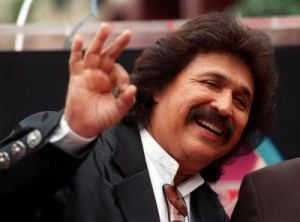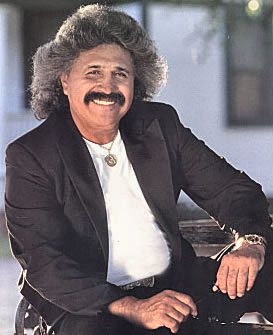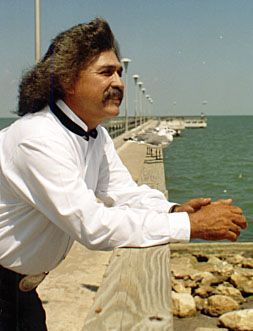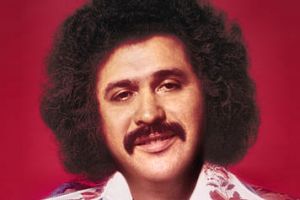DAVE'S DIARY - 19 OCTOBER 2006 - FREDDY FENDER OBITUARY
FREDDY FENDER RIP AT 69
BORN
BALDEMAR GARZA HUERTA - JUNE 4, 1937 - SAN BENITO, TEXAS.
DIED OTOBER 14, 2006 - CORPUS CHRISTI, TEXAS.
THE GOOD SAMARITAN
TAMWORTH POOLSIDE PAIN AND PASSION
 |
The
locale is the swimming pool at the Tamworth Travelodge and the time
- about high noon on a hot January day circa 1983. There is a deafening curse in Spanish as a large late model car driven by the genial large tour promoter roars to life after stalling and burning rubber. "Unfortunately the car skids before stalling yet again - this time the Good Samaritan, who is pushing while the driver is pulling, strains a calf muscle. |
It’s the biggest story of the festival acted out in front of the metropolitan music media having a refreshing dip and sip in this roadside pool before yet another gruelling day in wheat belt honky tonks.
The reason - the pusher is the revered Tex-Mex country star Freddy Fender.
And the chauffeur is then Eltham tour promoter Wally Bishop - long time manager of Max Merritt - who later joins a Chinese circus as production manager in the wake of his brave Merle Haggard sojourn in the summer of 1996.
Fender’s calf is as torn as the battery of Bishop’s limo - legacy of the promoter failing to douse the lights the night before.
But, now
with sun beating down, Freddy is rushed to hospital in the offending vehicle
and the calf muscle is diagnosed."
For the remainder of a month long Australian tour, Fender's first since
1976, he limps on stage nightly on crutches to a spot lit stool.
It's just another pathos-primed page torn from the sensational career
of the three-time Grammy award winning singing actor.
He almost reached 70 in a life littered with health hurdles, prison after
a dope bust and battles with the bottle and bankruptcy.
"Thank
you for writing such a nice Diary obituary about my father Freddy Fender,"
his daughter Tammy Huerta Mallini wrote to Nu Country. "He went bankrupt
due to his bands bus having a head on collision with an 18 wheeler and
was cut in half in Louisiana interstate 10 and several died. I was there
in Slidell when they just had dropped him off."
But he beat a regular path to Australia, beginning with his 1976 debut
at Festival Hall in West Melbourne.
Fender, who adopted his stage name from his guitar, finally succumbed
to lung cancer in Corpus Christi, Texas, after his life was prolonged
by kidney and liver transplants.
It was the end of the road for a legend whose music underwent as many
rebirths as his peers in latter day super groups Texas Tornados and Los
Super Seven.
SOUTH TEXAS ROOTS
It all started
back in the thirties in the Rio Grande Valley of south Texas.
Fender was born Baldemar Huerta on June 4, 1937, in San Benito to Serapio
and Margarita Huerta.
His originality showed from the age of 5 when he was already picking a
makeshift guitar constructed with a sardine can and stretched screen-door
wire.
When Fender was 10 - two years after the death of his father - he debuted
on radio at KGBS-AM in Harlingen, singing Paloma Querida.
According to folklore this won him a tub of food worth about $10.
His parents were migrant workers and Fender travelled with them to Arkansas,
Ohio, Michigan, Indiana and other points north - wherever there were crops
to pick.
The family worked alongside African-Americans so Fender soaked up their
blues.
Back in San Benito during winter, he would sit outside Pancho Dalvin's
grocery store, plucking a backless, three-string guitar.
Raised in one of San Benito's barrios, he was exposed at an early age
to a wide variety of traditional Mexican music and polkas, popular in
the Rio Grande Valley.
But Fender chose barracks ahead of barrios and joined the Marines at 16
in 1954 and came out three years later after serving in South Korea with
dreams of becoming the first Chicano rock 'n' roll star.
His specialty was adapting the big hits of the day to Spanish lyrics.
He had a hit in Mexico and South America in 1957 with No Seas Cruel,
his version of Elvis Presley's Don't Be Cruel.
When signed to Imperial Records, home of Fats Domino, in 1959, he became
Freddy Fender after his favourite guitar.
"Just think," he told an interviewer years later, "if I
had been playing a Yamaha guitar, I'd be the No. 1 act in Tokyo."
TWO JOINTS AND FIVE YEARS
| But
while on tour in May 1960, Fender and his bassist were arrested for
possession of two meagre marijuana joints in Baton Rouge, Louisiana. They were sentenced to five years at infamous Louisiana State Penitentiary, Angola - a maximum security prison that housed murderers and other violent criminals. His early release came when singing Louisiana Governor Jimmie Davis paroled him after three years. Davis, who lived to the ripe old age of 100 after serving two terms as Governor, also wrote You Are My Sunshine and was inducted into the Country Music Hall of Fame. While inside Fender cut a single on Gold Band Records and album on Power Pack. |
 |
After release Fender moved to New Orleans and spent five years playing in the clubs of the French Quarter where his peers included Aaron Neville.
During his
time in Louisiana, he was influenced by the region's swamp-pop music,
a blend of country, rock and Cajun styles.
Unable to get his music career back on track, he returned to San Benito
in 1969 and took a fulltime job as a mechanic.
He also enrolled at Del Mar College in nearby Corpus Christi, Texas, and
sang for his supper in cantinas on weekends.
DOUG SAHM CATALYST
When Doug
Sahm recorded Wasted Days and Wasted Nights on his 1971 project
The Return of Doug Saldana, the track opened with a salute to the
man who wrote it.
"And now a song by the great Freddy Fender," Sahm said, his
voice drenched in echo.
"Freddy, this is for you, wherever you are."
Doug had seen him play a San Antonio drive-in at the peak of his popularity
and was mightily impressed.
When word reached Fender his old records were hip in Austin, he got in
touch with Sahm, his future co-star in nineties Tex-Mex supergroup Texas
Tornados, and was booked at the famed Soap Creek Saloon.
When Fender arrived to see longhaired lads in cowboy hats outside passing
joints, he was apprehensive.
But the show was a raucous sell-out, the crowd swaying to his swamp pop
"triplets" and stomping to his Chicano R&B, and Fender's
musical dreams were rejuvenated.
HUEY P MEAUX AU GO-GO
Fender also
reconnected in the mid-1970s with famous Houston producer Huey P. Meaux,
who signed him to his Crazy Cajun label - springboard for Doug Sahm and
the Sir Douglas Quintet.
Moe Bandy, Barbara Lynn, Mickey Gilley, Delbert McClinton, Clifton Chenier,
Johnny Copeland, B.J. Thomas, Roy Head and Ronnie Milsap also recorded
for the producer.
Meaux was a charismatic character - no stranger to prisons with stretches
for dope and sex offences as recently as the new millennia.
"I met him in Houston and he'd just been in the penitentiary for
transporting some girls to some DJ convention in Nashville," Fender
later revealed.
Although Fender and Meaux intended to make an R&B album, the producer
found a country song that was perfect for Fender's delicate, quavering
vocal style.
"I don't want nothing to do with country," Fender said when
he heard a demo of Ben Peters-Vivian Keith tune Before the Next Teardrop
Falls.
But after about half an hour of arm-twisting, Meaux persuaded Fender to
cut it for Crazy Cajun - it received national distribution on the ABC/Dot
Records in 1975.
The single was released in January and shot up country charts, staying
at #1 for two weeks before crossing over to the pop charts.
The follow-up, a re-recording of 1959's Wasted Days, also landed
at #1 on Billboard country singles chart and reached #8 on the pop chart.
Penned with club owner Wayne Duncan - not the Daddy Cool bassist - the
song was an apt reflection of Fender's draconian sentence.
His other Top 10 hits include Since I Met You Baby, Vaya Con Dios,
Living It Down and a remake of the Sir Douglas Quintet's '60s pop
hit, The Rains Came.
Secret Love - (a pop #1 for Doris Day in 1954), and You'll Lose
a Good Thing also hit #1 on country charts.
At the peak of fame Freddy bought a house on Ocean Drive, Corpus Christi,
where he parked his custom hot rods on the front lawn.
After his mid-1970s boom, Fender recorded a dozen albums with minimal
success.
By the end of the ride, in 1980, he was strung out on dope and booze and
bankrupt with $10 million in debts.
He also accused Meaux of taking advantage of him through unscrupulous
contracts.
MOVIES AND BALLS
 |
Fender
also acted in several films, including the 1977 prison drama Short
Eyes and 1979 western She Came To The Valley in which he played
Pancho Villa. He was later cast in 1988 film The Milagro Beanfield War. Directed by Robert Redford, the cast included Rubén Blades, Sonia Braga, Melanie Griffith, John Heard and Christopher Walken. When he auditioned for director Redford, he was asked his acting experience. "Man, I shoulda won the Academy Award for all the stories I told my wife when I'd come home late and drunk," Fender told Redford of his spouse Vangie Huerta - also his manager. |
"She
believed them."
Fender got the part as the town's mayor but in real life his marital recidivism
echoed that of fellow Texan Billy Joe Shaver who wed his wife Brenda three
times.
Freddy and Vangie first wed in 1957, then divorced but still lived together.
They remarried in 1976. Their relationship spanned 49 years.
The nightclub lifestyle continued to have its grip on Fender.
In 1985 Vangie, dropped him off at a substance abuse treatment facility.
He had been sober the last 21 years of his life. The needles he shared
while using heroin had a lasting effect, however.
Fender was diagnosed with hepatitis C in the nineties after playing at
inaugural balls for President George Bush in 1989 and President Bill Clinton
in 1993.
And Fender and Thom Bresh - son of the late guitarist Merle Travis - performed
their tune Both Sides Of The Border in 1999 movie Mi Amigos.
TEXAS TORNADOS
But in 1989,
his career enjoyed a renaissance when he joined the Texas Tornados, playing
the spicy stew of Tex-Mex, country and blues that impeccably reflected
his musical roots.
Fellow joined fellow Tex-Mex maestro and accordion ace Flaco Jimenez,
Sahm and organist Augie Meyers in the quartet.
With the Tornados' self-titled debut disc he won his first Grammy in 1990
for best Mexican-American performance of Soy de San Luis.
The album produced a country hit with Tex-Mex rooted Who Were You Thinkin'
Of?
He recorded three more albums with the Tornados - Zone of Our Own,
Hangin' on by a Thread and 4 Aces.
The group cut Live From the Limo, Vol. 1, on Friday, December 18,
1998 at Antone's - the famed Austin club owned by Clifford Antone who
also served a lengthy prison sentence for a much larger stash.
Antone died of a heart attack this year at 56 - seven years after the
disc's release on Virgin Records.
"He was a pretty humble guy considering he was such a singing legend,"
said Austin drummer Ernie Durawa, who backed Texas Tornados from 1990
until Sahm's death in 1999.
"He was always joking. Like when they gave him the key to the city
in Fresno, he asked if it could open the jail."
Another live performance originally recorded for an episode of the Austin
City Limits television series was released in 2005 by New West Records
as part of its Live From Austin series.
LOS SUPER SEVEN
In 1998 he
became part of Los Super Seven - a Mexican-American all-star band, which
included Jimenez, Joe Ely, Rick Treviño and Ruben Ramos.
The collaboration led to an album by the same name, released on RCA.
The CD, which won a Grammy, was a tribute to the musicians' roots and
influences, and included their interpretations of Woody Guthrie's Deportee
and Agustin Lara's Piensa en Mi.
In February 1999, Fender was awarded a star in the Hollywood Walk of Fame
after then-Texas Governor George W. Bush wrote to Hollywood Chamber of
Commerce endorsing him.
He said in a 2004 interview that one thing would make his musical career
complete - induction into the Country Music Hall of Fame in Nashville.
"Hopefully I'll be the first Mexican-American going into Hillbilly
Heaven," he said.
SOLO GRAMMY
 |
Although
he continued to tour, Fender's health began to deteriorate in the
late nineties. He received a kidney transplant from his daughter, Marla Garcia, in 2002 and a liver transplant in 2004. Fender won his third and last Grammy for Best Latin Pop Album for 2002 recording, La Musica de Baldemar Huerta - a return to the classic Mexican boleros of his youth. "I think I've been underrated for many years," he told USA TODAY in 2002. "I have seen many so-called singers go to the top who wouldn't sing a note out of a bucket. Or they go to the top because they kept their life straight and didn't mess with drugs and didn't make mistakes like I did. And I can out-sing 'em anywhere, but I'm under. Now, all of a sudden, things are beginning to cook again. |
"That's what life is - it's the hope that good things are going to happen, whether they happen or not. The hope is going to keep you going. That's what I got."
Fender told
the Austin American-Statesman in 2004 his proudest achievement was being
named in the book Above & Beyond as one of the Top 100 former
Marines who've conquered civilian life.
The singer said he was going to buy a copy for every drill sergeant who
kicked his rear end.
Fender was also honoured when his likeness was painted on the water tower
in San Benito, proudly proclaiming itself to be The Hometown of Freddy
Fender.
FINALE RECORDINGS AND CONCERT
Fender performed
a career retrospective show Freddy Fender: 50 Years Of Music, at the Paramount
Theatre in April 2004, just three months after the liver transplant.
Flaco Jimenez recalled spending a day in May 2005 with Fender recording
the Dos Amigos CD at the North Side San Antonio studio of Michael
Morales.
"It was fun because we were free to do whatever and we just let the
tape roll non-stop," Jimenez said.
Morales, who produced Dos Amigos with his brother Ron, said it
was the first time Fender and Jimenez recorded a duet.
"They're the Paul McCartney and Mick Jagger of Tejano. They're Tex-Mex
royalty and they'd never before done a duet," Morales said. "It
was a long day but it was a blast."
Fender also recorded another 2005 duet with fellow Texan Clay Walker who
was diagnosed with MS at 26.
"Freddy was an icon for country music and the American dream. While
recording a duet of Before the Next Teardrop Falls with Freddy
this year, it was evident that he still had the fire that burns in the
belly of "true" artists," Walker said.
"It was the first time I have ever had chill bumps in a studio. He
was a champion and a warrior and now he has become my hero. Thank you
my friend. Save a spot in heaven for me in your angel band."
Fender's last performance took place on December 31, 2005.
HEALTH FINALE
 |
"I'm
not one to think like 'poor me,' " Fender said in 2004. "I've
always accepted the ups and downs. Maybe I've had to start all over
again a few times, but at least I'm not an old cup of stale coffee.
I've had a few refills." He had been fighting cancer since January, when two tumours were found in his lungs. By June, after chemotherapy and radiation to eradicate the tumours, nine more were found during a CT scan. |
Although
chemotherapy robbed him of his hair and much of his strength, Fender was
upbeat and positive, his wife Vangie said before his death.
"Freddy doesn't act like a 69-year-old man," she said. "Freddy
acts like a kid. He's always been very childlike. He likes to play, tell
dirty jokes, play with the grandkids. It's heartfelt.
Freddy makes everybody feel like he's known them forever. He has a beautiful
personality."
He was being treated at a hospital in Tulsa, Oklahoma, when transferred
to another medical centre in San Antonio on October 4 because of a blood
infection.
Fender was released from the hospital Thursday October 12 and returned
to his home where he died.
Survivors include wife Vangie; sons Baldemar "Sonny" Huerta
Jr. of Corpus Christi and Daniel Huerta of Jacksonville, Florida; and
daughters Tammy Huerta Mallini of Houston and Marla Huerta Garcia of Victoria.
Another son Billy died in a car accident at 20.
THE FUNERAL
More than
500 family members, friends and fans filled the Queen of the Universe
Catholic Church in San Benito to capacity on Wednesday October 18 for
Fender's funeral, with about a hundred more spilling onto the front lawn.
More than two-dozen police cars lined the almost mile-long route from
the funeral home to the church.
A bright red San Benito fire-truck with lights flashing led the procession,
which included a white hearse and several stretch limos.
The solemn procession was like a parade, especially when it made its way
along a half-mile stretch of Freddy Fender Lane in El Jardin - the barrio
where he grew up.
Hundreds of people stood or sat along the curb to wave farewell to one
of their own who had made it to the big time.
TV news crews from South Texas cities stood alongside clusters of cheering
middle school pep squads and city workers.
Some fans held up big signs and portraits of Fender.
A sign held by a young boy captured the day's sentiment: "Freddy,
you were from El Jardin, and now you are going to another beautiful garden."
Gray clouds rolled overhead on the stiflingly humid day, but it did not
rain on Fender's final ride.
Several hundred more fans packed the grounds of San Benito Cemetery, where
Fender was buried.
Ironically, Fender who suffered a Johnny Paycheck like battle with the
brig in his service days was buried in a white Marine Corps military dress,
a Marine Corps League hat folded at his waist.
Family snapshots filled the inside of the coffin.